The eve of the celebration of All Saints Day is Halloween. What started off as a spoof of celebrating All Saints is not much bigger and profitable than the day it spoofed. Halloween has a life of its own far surpassing All Saints Day and basically has eclipsed it. How many children know about Halloween compared with how many about All Saints Day? The spoof has spanked and swallowed the spoofed.
The Church and State are thought of in the USA to be separate. But are they really? The State declares war and the church follows along. The State is build on works of profit not works of mercy and the church follows. Individualism is rampant in the State and the Church follows. The State teaches values of loyalty to State and Country, even over God, and the Church follows. The State has enveloped the Church.
People pray at worldly events, like football games, for God to bless them and all Americans. We have soldiers of the country but need soldiers for Christ.
The State loudly tells us the more stuff we have the better we are. The Church quietly says we are all equal but is also looking for more stuff.
The State is supposed to serve the common good, according to Church; but in practice the State and Church serve the individual. All Saints day is in the shadows of its eve, Halloween.
All Saints day will come and go, but fear strengthen on Halloween remains. Halloween bests All Saints.
Tonight preparing dinner I took out of the refrigerator a bag of green peppers to cut up and put in the salad. However, I mistakenly took out a bag of Ghost peppers, one of the hottest peppers in the world. Getting suspicious I decided to taste a small piece. My mouth immediately went hot and although I spit up the small piece my mouth still was on fire. I tried washing my mouth out, brushing my teeth and drinking lots of water. Nothing worked. Then my friend Jerry, who was working in the kitchen with me, suggested I drink some milk. Desperate for relief I tried drinking a glass of milk. Gradually it started to work and before long the burn sensation worked. I asked Jerry how he knew about milk and he said he learned about it during his years living in the Southwest.
I very seldom drink milk these days. I think it was because my mother made me drink lots of milk when I was young, to build my bones, so now that I am an adult I feel like I have drunk enough milk for a lifetime.
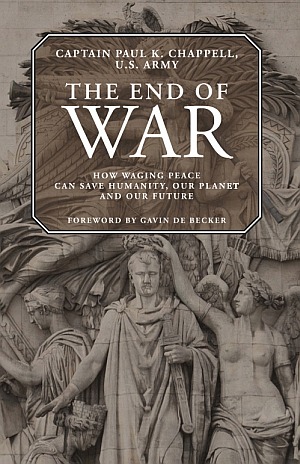
“The End of War” by Paul ChappelTonight I read an article in the National Catholic Reporter about a book from a former soldier who has gone from waging war to waging peace. The name of the book is called “THE END OF WAR: How Waging Peace Can Save Humanity, Our Planet, and Our Future” and is by “Captain Paul K. Chappel”. Also today I heard about a new film called “Unmanned: America’s Drone Wars” that can be seem free via the internet starting tomorrow. This book and film both point to a growing awareness in our society that there is something deeply and disturbingly wrong.
Can this new and growing awareness top the decline of the United States Empire? Probably not but it can add to a developing awareness that there needs to be decisive changes in our society and nonviolence is the only way to accomplish this task. Within the cracking shell of the US Empire we can build a new society so when the empire finally does fall we will have a new and refreshed society already in place.
From awareness will hopefully grow resistance and we will finally be able to not fear the ‘powers that be’ and have the courage and strength, like that of a soldier, to wage peace.
Someone once pointed out to me that I stayed one step ahead of where most people are at, looking for the next challenge and action. Perhaps this is true. But I must look to what could be, be it with money from closing churches to eliminating military training to kill at the local Catholic Jesuit University of Marquette University. Seeking and finding hope in the present is the only way I know to keep hope alive.
Hard Heart - Monday, October 28, 2013
“Today, if you hear his voice, do not harden your hearts” Psalm 95: 8
My wife, Pat, and I both reported headaches today. I am not sure if it is a result of ‘noise’ from last week in Disney World or something else. By ‘noise’ of Disney World I do not only mean sounds but all the lights and action coming at you all the time. It is like you are part of a non-stop parade where you need to keep going to keep going.
Coming home I find myself catching up, doing the laundry, grocery shopping, preparing dinner, picking up the house, calling people and being called, gardening, writing and all the little stuff that makes for a busy day. But the difference between this busy day and last week is the constant ‘noise’. Here I can stop when I want, quiet myself and find the silence at the heart of my being. It is easier to be discipline in this busy life than in the noisy world of last week. I realize that a world with silence at its heart makes discipline easier than a world with noise at its heart.
I heard today that our local Catholic Church decided to take the 1.1 million dollars of abundance that came to it from results of closing another Catholic Church in North Central Milwaukee and put it into an endowment fund for future church use rather than use it for the works of mercy. Greed, getting all the stuff or money you can get, seems to have infiltrated the Catholic Church as well as the secular world around us. No poor person, in reality or spirit, is safe in this world of acquisitions, getting more and more and greed.
In the 60’s we fought for open housing for Milwaukee. We got the law we sought but lost the war since the very area we fought from is now the most segregated part of the most segregated city in the USA.
In the 90’s in our Catholic Church we talked and talked about the “preferential option for the poor” and now in Milwaukee the Catholic Church takes money out of the poorest neighborhood in the four poorest city for the endowment, for future use.
Maybe we all have grown deaf from all the ‘noise’ of the world and we no longer hear the Word of God that is spoken to us. If we cannot hear, see and touch the presence of God in the world, especially in the poor and marginalized, perhaps we have grown hard of heart.

At Disney World you can
purchase Buzz Lightyear
Made in China When visiting Disney World last week I overheard a child being asked what is the best thing they liked about Disney World. The child responded: “I like all the stuff you can get.” Probably the child’s answer would have been different thirty minuets later but this answer struck me as being honest and something adults will not so readily and admit. Disney World was full of stuff to purchase, to eat, experience. Trying to keep a Silence of the Heart was a major challenge in a place full of stuff, people, noise, stimuli.
Disney World is a celebration of American fantasy culture for white people from around the world. There were very few African American in the crowds of hundreds of thousands in the four theme parks. Disney World appeals to the belief that American culture is special or exceptional in the world. Many of the other cultures represented in Disney World are presented as being like American culture.
There was so much to see, hear and experience that it was tempting for me to just numb one self, smile and move on. However, I tried to experience what was happening around me, to see, hear, smell, touch and taste. But there was too much to take it all in. This is the new dream of Americana culture.
The statement of the child, liking Disney World for all the stuff you can get, reminded me of statements about the New American Dream, “to get all you can get.” The American dream of house, car and providing for the family seems to be no longer enough. The new American dream is to get “all the stuff you can get.”
Yesterday I talked about silence at the heart of all we do. This Diary of the Worm will go silent for a week, coming back Sunday, October 27th. It will be time for me to ponder how to keep silence at my heart as I continue to “Speak out on behalf of the voiceless”, (Proverbs 31: 8) I may be surrounded by noise next week but I will work on being Silent at Heart. We need to “live like a monk in the middle of the noise of the city.” (Adolfo Nicolas S.J.) There is much to do but without silence we cannot do anything.
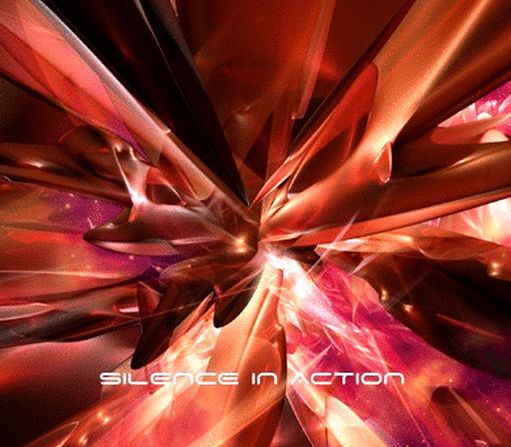
Silence in Action The other day in an email I was invited to submit a workshop proposal for the upcoming Ignatian Spirituality Conference (ISC), sponsored jointly by the Jesuits and Saint Louis University. I had attended this conference, that is held every three years, a few time and about seven years ago had submitted a proposal that I believed was creative and informative. Rather than say no to the proposal they said that someone was already covering that topic. I attended that conference and went to the presentation that was supposed to mirror my proposal. The person started off saying she had been asked to talk about the subject of my proposal, admitted she did not know much about it, said a few words, and then went on to present on a completely different subject. I was upset and did not submit a proposal or attend the next conference.
However, this upcoming conference intrigues me since it is about Ignatian Spirituality and proposals are asked to relate in some way to the reflection of the present Superior General of the Society of Jesus, Jesuits, on Silence that is below. The heart and depth of silence in our busy everyday lives has been something dear to my heart and drive. I doubt if anyone would call me a man of silence but the silence described below is the type I strive to achieve. This invitation also reminds me that I should finish putting on the web the Retreat in Daily Life called “Finding God in All Things, A Retreat for A Pilgrim In A Busy World”. It is an adaption of the Spiritual Exercises of St. Ignatius of Loyola, founder of the Society of Jesus, in a thirteen week format.
But now to the heart of the matter, the quote on silence:
“Thus, although this may surprise some, I believe that one of the primary challenges facing the Society today is that of recovering the spirit of silence. I am not thinking of disciplinary measures, fixed times of silence, going back to religious houses that look more like monasteries. Rather, I am thinking of the hearts of our men. We all need a place inside ourselves where there is no noise, where the voice of the Spirit of God can speak to us, softly and gently, and direct our discernment. In a very true sense we need the ability to become ourselves silence, emptiness, an open space that the Word of God can fill, and the Spirit of God can set on fire for the good of others and of the Church. More than ever, every Jesuit should be able to live like a monk in the middle of the noise of the city – as an Orthodox friend of ours once said. That means that our hearts are our monasteries and at the bottom of every activity, every reflection, every decision, there is silence, the kind of silence that one shares only with God.” (Reflection by Adolfo Nicolas, Superior General of the Society of Jesus.)

Greem Ghost Peppers With a winter frost coming soon, I picked the remaining ‘ghost peppers’, one of the world’s hottest peppers, in the garden. In 2007, Guinness World Records certified that the Ghost Pepper (Bhut Jolokia) was the world’s hottest chili pepper, 400 times hotter than Tabasco sauce; however, as of 2012 it was superseded by the Trinidad Moruga Scorpion. They were still green with not much chance of turning red/orange when they are ripe for picking. There were an astounding 140 green ‘ghost peppers’ left to pick. Now they are in the dehydrator and then to the freezer ready to be ground in one very hot pepper sauce.
My friend, the only person I know who can eat them, says they were tasty with food. In fact they are so hot that I needed to wear gloves when working them and be careful not to breathe in too much of the pepper’s vapor or to rub my eyes. The dehydrator is in my sun room, an unheated room, that is blocked out from the rest of house with insulated door\windows. Going into the room to check out how they were doing I can feel the air full of smell of these hot peppers.
Today when I was preparing these ‘ghost peppers’ I thought that if I had planted them early in the season I would have had many more ripe ones by this time. Although my friend had told me about them it was not till late June that I discovered and platted two of them in my front yard garden. The rich soil full of worm castings seems to be perfect for their growth. I do grow other hot peppers for my own “Hot Joe’s” but they are never as plentiful as these ghost peppers.
I give them all to my friend who thinks my “Hot Joe’s” spice is mild. Maybe after they are dehydrated and in the freezer for awhile I will try a tiny bit of one with some food. But maybe not. I like hot spicy food but ghost peppers carry into a new level of spicy hot. Green Ghost Peppers are Hot!
Be it lost in space, lost at home or lost of the TV Remote, lost plays a major role in our lives. I heard that the Government shutdown, which just ended tonight, cost our economy 24 billion dollars. One would think that shutting down the government would save us money not cost such a great loss.
The loss of lives in USA wars since 9/11 is inconceivable. The loss of lives of Americans, Iraqi, Afghans, Pakistanis, Yemenis, Somalis are shocking yet we do not know what really happened on 9/11 and what caused this tragic loss.
When an American soldier is lost and killed in war many rushed to praise his or her honor and glory and neglect the many veterans who are homeless and suffer PTSD, a brain disease.
Jesus tells a parable about a shepherd who left his herd of 99 sheep to find one lost sheep. This is a story of great love for one lost one.
The lost of a loved one is devastating. The lost of any one human life is unacceptable. The commandant is “Thy shall not kill” with no qualifiers.”
I have heard say that one person’s lost is another person gain. Be not afraid of a loss.
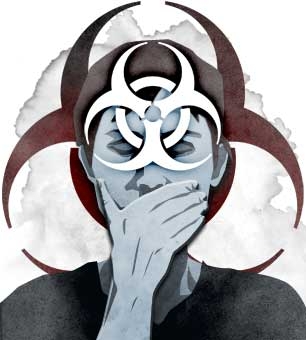
Image by Jared Rodriguez Community Organizations, like Common Ground here
That trace its roots, it says, to Saul Alinksy, a great community organizer
Are now accepting grants from banks and the government,
Something that would have been Alinksy’s worst nightmare.
Right wing political organizations like the Tea Party
Are reading Alinksy book, Rules for Radicals
And practicing his confrontational tactics.
Wisconsin government is deep in debt,
Less money for schools and health care,
Yet our governor proposes using a 100 million surplus this year
To give each homeowner a $13 tax cut on property tax.
The USA has the most people per population incarcerated
And Wisconsin has the most African Americans per population incarcerated
Yet justice has come to mean more punishment and putting more persons in prison.
We live in a culture of extreme violence in the media, war and on the streets
Yet guns become easier and easier to purchase and use.
Pastors in Milwaukee want a payback program to purchase guns
So those with illegal guns cannot make some money from old guns
To purchase new guns.
The gospels are full of paradoxes, the last shall be first,
The poor shall inherit the Kingdom,
We need to die to rise,
What we do to the least in our society we do to Jesus.
We need to live and make peace with paradoxes.
But what we have above is an upside down world
That we cannot seem to set right.

Child Soldiers of Sierra Leone When trying to explain to people the immorality of what is being taught in the three Departments of Military Sciences at Marquette I often say they teach reflexive killing, Killing without Conscience. I picked up this term from a West Point ethics professor in the movie Soldiers of Conscience. Yet often persons do not fully understand the moral implications of what is being taught at Marquette.
Last week at the Marquette conference on World Religions and Nonviolence I asked each of the seven experts if, in their faith tradition it was morally justifiable to teach killing without conscience or conditioning people to kill. For an example, I used the child soldiers of Sierra Leone that were conditioned to kill during the civil war. I know some about this type of training to kill from my friend, Mathias, who was a political exile from Sierra Leone for trying to free child soldiers. Child soldiers were so traumatized by the experience of being conditioned to kill reflexively that when they were freed from the experience they could barely talk about their atrocities but expressed feelings in drawing pictures. This type of conditioned killing is wildly condemned but it is similar to what our soldiers are trained to do in military training.
No one from Marquette Administration or the military has ever denied this type of training takes place in at the university. In fact, the military even brags about it and how using it has increased the rate of soldiers firing weapons at the enemy from 25% in World War II to 95% in the modern day wars. The military ethic professor at West Point says, when explaining to military personnel, why they need to teach this type of killing is morally justified: “Modern combat training conditions soldiers to act reflexively to stimuli—such as fire commands, enemy contact, or the sudden appearance of a “target”—and this maximizes soldiers’ lethality, but it does so by bypassing their moral autonomy. Soldiers are conditioned to act without considering the moral repercussions of their actions; they are enabled to kill without making the conscious decision to do so. (January 27–28, 2000 by CPT Pete Kilner, instructor at the U.S. Military Academy) “Military Leaders’ Obligation to Justify Killing in War”)
So from now on I am better saying that what Marquette teaches in the school of the Army on campus is conditioned killing, killing without conscience, killing like the child soldiers of Africa are taught. In fact when you think about it by video games, TV, Movies easy access to guns and encouragement to use them we all are being conditioned to kill.
Yesterday we were leaving a home after a St. Vincent De Paul home visit when I saw a sticker on the outside of the window in the first float flat. The picture of the gun with “We don’t dial 911 made me think of quote that Thomas Merton wrote in 1968 about violence in our American culture. He said:
‘’
“The real focus of American violence is not in esoteric groups but in the very culture itself, its mass media, its extreme individualism and competitiveness, its inflated myths of virility and toughness, and its overwhelming preoccupation with the power of nuclear, chemical, bacteriological, and psychological overkill. If we live in what is essentially a culture of overkill, how can we be surprised at finding violence in it? Can we get to the root of the trouble? In my opinion, the best way to do it would have been the classic way of religious humanism and non-violence exemplified by Gandhi. That way seems now to have been closed. I do not find the future reassuring,”’‘ — (Thomas Merton edited with an introduction by Gordon C. Zahn (Boston, MA: McCall’s Publishing Company, 1971), p. 230
Thomas Merton, a Trappist monk, who lived away from the world, had enough insight to describe how violence is embedded in our culture. Our President sends ”Killer Drones” to assassinate people all over the world. Child soldiers in Africa and American university students are conditioned to kill without conscience or thought. Our country sheriff encourages people to buy guns to protect themselves as well as the sources mentioned by Merton in the quote.
Violence begets Violence, Faith and Violence are incompatible, killing leads to more killing, we are numbed to violence in our American culture are easy to say but what are we, or can we, do about it. Wisdom leaders like Dorothy Day or Martin Luther King Jr. that ending violence in our culture starts with us. Dorothy Days says: “The greatest challenge of the day is: how to bring about a revolution of the heart, a revolution which has to start with each one of us?”
“We all know the destructive power of violence but some of us need to learn the healing power of nonviolence not just in words but in heart, mind and action. Nonviolence is a powerful and just weapon. which cuts without wounding and ennobles the man who wields it. It is a sword that heals.” (Martin Luther King, Jr.)
Jerry Zawada returned here today for a few days until he goes to Tacoma, Washington for his trial on crossing the line on the Trident Nuclear Navel base. Jerry is a Catholic Franciscan priest full of stories from his many years of opposing wars and nuclear weapons.
Last night on Public Television Travis Smiley interviewed Journalist Eric Schlosser who had just written a book Command and Control in which he examines the dangers of America’s nuclear age. It was scary hearing him talk about the near disastrous accidents in the USA over the years. However, when came to the present he said we were no longer building new nuclear bombs. President Obama has approved three new nuclear weapons facilities, one in Los Alamos, second one in Oak Ridge, Tenn., and the third in Kansas City, Mo. Now these new nuclear bomb factories are replacing old ones, however, they are still building new nuclear bombs. Where these bombs will go is unknown at the present. I was surprised at this statement, no more nuclear bomb being built, by a reporter who was warning us of the danger of nuclear bombs. John Dear S.J., peace activist notes in the National Catholic online news of Feb. 10, 2010 “As Obama feeds the nuclear weapons industry with a $7 billion increase, he’ll go through the motions of hammering out a disarmament deal with Russia and of reviewing the Nuclear Non-Proliferation Treaty and the Comprehensive Test Ban Treaty. In that convoluted logic, so common to the holders of nuclear weapons, he thinks he can promote peace while adding billions for nuclear advances.”
One would hope that from the past, nuclear bombs destroying Hiroshima and Nagasaki, as well as the near accidents in the USA we would have learned that nuclear weapons does not bring peace but more nuclear weapons in more and more countries.
Thinking about this situation as well as why Marquette University continues to teach conditioned killing when all major religions condemn it, I, unfortunately, come to one conclusion: Money trumps morals. The same could be true for the Milwaukee Catholic archdiocese closing parishes in the poorest and most segregated neighborhoods of Milwaukee and then placing the money in an endowment fund rather than use it to serve the poor and marginalized. The god of money seems to be more important than the one and only God of our faiths.
We have been warned about putting money over our faith and values but yet we do it. I pray for the day when morals will trump money.
I liked taking something I read in the newspaper and relate it to the Gospel and my beliefs and faith. Today’s headline made doing this easy. It read: “Walker seeks tax cut” and the sub headline was “$100 million surplus would reduce statewide property taxes by $13 per home.” In these postings on the Diary of the Worm I have been talking about the New American Dream, how the old American Dream about having a job, home, education and family has been replaced by the new American dream “get all you can get”.
Reading the newspaper article made me want to write a “Letter to the Editor” of the newspaper using this article and others ones in the newspaper to point to what I consider a central issue of our time: Individualism vs. Common Good.
The letter might not be published in the newspaper but here it is:
Dear Editor,
Today’s Milwaukee Journal Sentinel headlines states Governor Walker is proposing a $100 million tax cut which would reduce my property tax about $13. If the proposal is passed I would like to donate my $13 tax cut to the people, low income people, whose taxes were raised in the Budget bill, Earned Income Credit taxes and Homestead Credit taxes. ( See MJS PoliticalFact of December 12th, 2011.) If my $13 cannot be used to erase these tax increases I would like it used for food stamps or health care for Wisconsin residents for those being cut or eliminated.
If the Governor can find a million or so left in the budget surplus I would suggest it be used for a Sustainable Fund for the Works of Mercy in Milwaukee’s North Central areas, the poorest and most segregated in the city and state. When the Catholic Archdiocese closed our church in this area a few years ago we urged the Church to use the money for the corporal works of mercy in this area.(MJS article Northwest side Catholic parish ponders use merger money, MJS, Jan. 9, 2013). The money is needed to provide vouchers for beds, stoves and refrigerators which are a major problem due to bed bugs and many landlords no longer supplying appliances as part of the rent. The 1.1 million was given to another church whose leaders are proposing of putting this abundance into an endowment fund.
Our faith traditions teach us that our “abundance” needs to be shared with those most in need.
Yesterday I went down to Marquette University to leaflet about ending ROTC on campus. I knew my regular companions, Brian and Jan, could not make it but, since I had advertised it, I expected other persons to join me. So I made a few extra leaflets at a nearby copy shop and went to our meeting spot near Gesu Church. No one was there and I felt disappointed since leafleting had proved to be effective way of getting information out to students. The first person to take a leaflet was an African-American student. As he was taking the leaflet he asked me if I was Bob Graf. Reluctantly, as I do when someone I do not know asks me if I am myself, I said yes. He thanked me for spreading the word about teaching violence and killing on campus. As we talked I learned he was a graduate student in Journalism and had just been on campus a few months.
A little while later a Marquette Security officer came up to me and asked for leaflet. I gave him one and he asked if I was Mr. Hoffman. I knew he had the wrong name but right person so I said no and then explained to him that the banning order had been revoked by Marquette University, although I was on the sidewalk and not campus property. He went off to the side to call headquarters and came back to me and asked me if I knew I could now be on campus. I said yes and thanked him but was happy being on the sidewalk. I ended up moving up and down Wisconsin Avenue and around campus getting out many leaflets although I think students are more receptive to them when the giver is not me.
Today I made my first trip back to the Catholic Worker archives at Marquette since I was banned from campus. The Catholic Worker archivist, a friend, brought me out some material on the subject I am researching, the nonviolent actions of Dorothy Day, the co-founder of the Catholic Worker movement. I was hoping to find some recording of her non-violent actions but there is no such thing. He brought me a few archive boxes of Catholic Worker files and a thesis book on Dorothy Day and the Spirituality of Nonviolence. I was near the end of the two hour time period and had not really found any new information when I discovered in the thesis that Dorothy Day and her companions had written a number of pamphlets and leaflets. I sort of new a small part of it since I had discovered a quote from her as she was distributing leaflets against military training on a Catholic university in 1948, (See Dorothy Day and Military Training ) but was glad to hear of all the leafleting done by early Catholic Workers.
Also as I was looking in the last article in the last folder in a file I discovered a quote from Gordon Zahn, a famous peace intellectual and activist I had known in the last years of his life. It was a quote from 1961 but how Catholics who were true to their faith probably needed to pacifist and should accept it and rather than wasting time defending their beliefs should spend time looking at alternatives to war and violence. I often thing that we in the peace movement these days spent too much time on the defense and not go on the offense enough with “weapons of the spirit” as Dorothy would say, as I learned today in my research.
I probably should not have been surprised to see my disappointments turn into blessings. In today’s Gospel reading for liturgy Jesus tells his disciples: “And I tell you, ask and you will receive; seek and you will find; knock and the door will be opened to you. For everyone who asks, receives; and the one who seeks, finds; and to the one who knocks, the door will be opened.” (Luke 11: 8–12). All we need to do is ask, seek and knock.
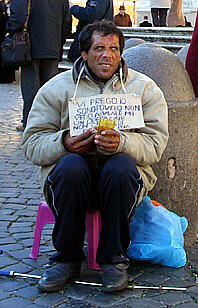
Blessed is the poor blind beggar
in the back of Church no one
sees (In my reflections of how we have changed from a society of opportunity to one of greed, about the Archdiocese of Milwaukee taking money intended for the poor and putting it into an endowment fund and the teaching of killing and violence at Marquette University, a Catholic Jesuit school reminds me of a talk I gave some years ago as part of earning my Masters Degree in Pastoral Studies from the University of Loyola in Chicago. I made the talk tonight into a written essay below. I still need to get it edited by the Director of Modifications for the nonviolentcow.org and perhaps cleared by the Director of Pastoral Studies for this web page, but for now here it is.)
“We declare to you what was from the beginning, what we have heard, what we have seen with our eyes, what we have looked at and touched with our hands, concerning the word of life—this life was revealed, and we have seen it and testify to it; and declare to you the eternal life that was with the Father and was revealed to us—we declare to you what we have seen and heard so that you also may have fellowship with us; and truly our fellowship is with the Father and with his Son Jesus Christ. We are writing these things so that our joy may be complete.” (1 John 1:1–4).
This statement describes a very real encounter with Jesus: seeing, hearing, touching Jesus. This statement is most fascinating in light of the fact that scripture scholars tell us that it probably was not written by John but by his disciples. These disciples probably had not even met the “historical Jesus.” Yet they felt the presence of Jesus so strongly that they could write with confidence that they are sharing a Jesus they heard, saw and touched so that “their joy may be complete.”
St. Ignatius in the Spiritual Exercises offers us a method of prayer in which we apply to our prayer our five senses of the body and the imagination: seeing, hearing, smelling, tasting and touching. He asks us to experience scenes in the life of Jesus with our senses. Thus we experience the presence of Jesus.
Our life, as followers of the Jesus flows from a personal experience of his living presence. For the early Christians a sensuous experience of Jesus was made easier, since they lived in the land, time period and cultural system in which the ‘historical’ Jesus was present.
In the times of St. Ignatius of Loyola this challenge to directly experience Jesus with the senses was also perhaps easier. People in the 16th century had very earthly images of Jesus. Jesus and his followers, the saints, were very real to them. This is evidenced in their architecture, statures, relics, devotions and religious art works.
In our day and age we might have images of holy persons we have known and touched, people like Dorothy Day or Mother Theresa or someone in our personal lives. However, we have a difficult time imaging Jesus as someone we hear, touch, see, smell and feel. Yet in our day much ink has been spilled on who the “historical Jesus” really was— what did he say or not say, what he did or did not do, the cultural and physical environment of 1st Century Palestine.
Despite all this scholarship, discussion and debate as Christian peoples in the USA we seem to be no closer to experiencing with our senses the living Jesus than the homeless beggar who sits in
Today Pat and I drove up to Pulaski, WI to watch our grandson play his last football game of the fall. (He is the one in the middle of the picture with the football.) His eight grade Middle school team won keeping them undefeated for the season. I had mixed feelings watching him play. On one hand the game was exciting and close but on the other hand I feared he would get hurt.
Although he is a talented quarterback once and awhile players come through the line unblocked and flatten him. A few weeks ago, in the only other game I saw this year, he was hit in the head quite hard on the second last play of the game. Fortunately and hopefully he did no sustain any head injury.
On the way to Pulaski in the car Pat and I were doing some faith sharing about our fears. We had this same question, what do we fear, in our Tuesday Faith Sharing group a month or two ago. It is an interesting question for reflection and, being honest, brings out some deep rooted fears we all have. Facing fears is important for us otherwise they can control us.
On the way up North we noticed the beautiful fall colors on the trees. The change in the temperature triggers the tree so they shed their leaves to prepare for greater exposure to sun in the winter. If the leaves do not die and fall, the tree might die.
What do Fall, Fear, Football, Fading leaves have to do with each other besides all starting with F? My experiences today was a reminder to me that unless I face my fears, allow them to fall like leaves and face the challenges of the dying of the Fall there will be no less of meaning for me.
I try to learn about nonviolence and apply it to my life as a way of life, to face the violence and killing that surrounds us. However, as Gandhi reminds us “Just as one must learn the art of killing in the training for violence, so one must learn the art of dying in the training for non-violence.”
So my grandson’s last football game this fall was played. But the art of dying, letting our leaves fall, we must always continue to learn in our training to experience the love and peace of a non-violence.
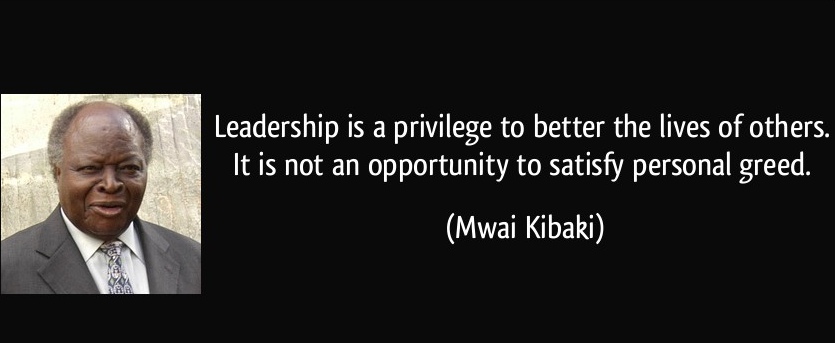
“Leadership is a privilege
to better the lives of others.
It is not an opportunity to satisfy
personal greed.” (Mwai Kibak
former President of Kenyan) Sunday night on the TV show 60 Minutes I saw a segment on persons with disabilities receiving social security supplement income, SSI or SSID. The numbers of claims for such help as increased significantly in five years which sounds normal in a declining economy for low income persons. However, the focus of the segment was not on how the poor are growing poorer but how some persons without disabilities may be receiving Federal income.
I have noticed that over the last 10 years it is harder and harder for persons with disabilities to qualify for SSI. The implication of the show was that more and more persons without serious disabilities, just poor and out of work are receiving benefits with the help of smart lawyers who receive payment from the government for the application. I am sure there is fraud in the system but I doubt it is nothing compared to the fraud and profiteering of Wall Street the last five years.
I thought it odd that in this time of increasing disparity of income between rich and poor that ‘60 Minutes’ would focus on the poor struggling to survive.
Social Security Income for disabled is about 500 −800 dollars a month while the rich probably make that per hour on their investments, money making money.
The other day I read an article how Democratic Administration might be, with help of media, setting the table for a budget cut in SSI and SSI payments in some sort of deal with the Republicans. The article gave examples from the liberal media about this focusing on the poor not reach who do not need any SSI from government. Are we being prepared for another round of greed, taking from the poor to give more money to rich?
As part of our Treasurers report of our St. Vincent De Paul conference, established to serve the poor without judgment, a member focused on possible hustling of us by changing names when calling in for help. If a Doctor or Lawyer makes some minor defraud of the system we deal with the particular individual but not the whole group. However, when a poor individual plays the system for a little more we tend to categorize all poor persons.
I tried to find the article tonight about how government, Democrats and liberal media might be setting us up to justify a cut in the Federal payments to those with disabilities. It sure smells that way. The American Dream has changed from providing for oneself and family with house, car, education and providing opportunities for next generation to one of getting what you can get, taking the short term benifts and let the next generation suffer the consequences. We have moved from a society of opportunity to one of greed.
“Look for solutions with love; do not harm anyone among you to solve a problem.”
-Pope Francis at Assisi, October 4, 2013
A friend, Father Emmanuel Charles McCarthy, a Melkite priest, send me this quote above. He added this simple commentary: “That is Gospel Nonviolence in a nut shell.” Father McCarthy has spend his life exploring the Gospel of Nonviolence and is founder of the Center for Christian Nonviolence. Another quote that has come my way recently, this time from the 13 century Sufi mystic, Rumi: “Raise your words, not voice. It is rain that grows flowers, not thunder.” These two quotes, put together, represent what I would like to be: A gentle, kind, persistent person struggling to seek the truth in words and action.
I know that I am a loud that often hurts people in my trying to solve problems. A friend, who knew Dorothy Day, co-founder of the Catholic Worker told me she was a strong and firm person of her beliefs but gentle and kind to all. There are many stories of Mahatma Gandhi showing love and respect to his enemies and friends, even those trying to kill him.
A Catholic priest friend of mine, who has spend a number of years in prison for acts of civil disobedience told me that he felt most at home and peaceful in prison. I remember back in 1969 – 1970, when I spent a year in the state’s maximum security prison, fellow prisoners telling me the hardest prison time to serve was when one was counting time to release. Prisoners in for life, with no chance of release, I noticed after a period of rebellious activity settled down and were gentle persons. To “look for solutions with love”, to raise your words, not voice”, and to be like the rain not thunder takes courage and discipline, thinks I often lack. The silence of the life Rumi and Pope Francis are talking about is scary.
Being called an “activist” is something I have tried to avoid in my life. I recently learned that it is a good and complimentary label as long as the activism is accompanied by a quiet gentleness. The ‘activist’ part of working for Gospel values I have done but not been so effective by the how I have been an activist. Being a gentle giant comes brings to mind a quote attributed to St. Francis of Assisi to his followers: “Preach the gospel, and if necessary, use words.”
The last few days there has been a persistent rain and tomorrow, when I look at our rain garden. I will see all the fall flowers blooming. How to be a silent persistent activist, like rain not thunder, is a mystery worth exploring?
Milagro - Saturday, October 05, 2013

Milagro, born three months
premature, now 23, poor
but blessedWhen I was attending the symposium on Peacemaking and Nonviolence in World Religions I noticed a young African male sitting behind me. Although there were other young people at the symposium he was the only African young adult I could find. At break times we began a conversation and I found his name was Milagro which is Spanish for miracle. During the day we talked and he helped me connect my cell phone to the Marquette Internet.
He told me that his Mom named him Milagro since he was three months premature and his mom thought he was a miracle baby. I also learned he was presently staying at a homeless shelter and was twenty three years. Afterwards I asked him if he would like to go out for some food and we went to a local pizza parlor. I learned his mother was extremely schizophrenic and as a youngster he moved around all over the United States since his mom felt someone was following her and out to hurt her and her son. As a young child he thought this type of life, living from shelter to shelter was normal. The government removed him from his mom when he was older but dropped him when he turned eighteen. He has a father and a brother around the area but is alienated from them. As far as he knows his mother is homeless and in a shelter in some other city.
His first name is Spanish and he could pass as a Hispanic. However, his mother was white and Native American and his Father was Native American and African American. He prefers staying at a shelter in a Spanish speaking neighborhood for people take him as Hispanic and let him be. Homeless African American males tend to make fun of him and his light African American skin color.
He spends most of his day walking around the city seeking out jobs and going to libraries to study and learn. He also is a rap artist when he can be.
But the real miracle of Milagro is that he is so peaceful and self confident of himself. He told me once when he had a therapist who told him to take all kinds of medicine for what she saw as his depression. He told her that yes he suffered from depression but that was only natural living the life he had lived. His maturity and sense of presence was the real miracle. Seldom have I seen such a mature young male at 23. He is out to learn but we all can learn something from Milagro.
“REJECT THE PATH OF WORLDLINESS.THE PATH OF WORLDLINESS IS A HOMICIDAL PATH. THE SPIRIT OF WORLDLINESS KILLS! IT KILLS THE SOUL! IT KILLS PEOPLE. IT KILLS THE CHURCH.” -POPE FRANCIS, VISIT TO ASSISI, (10/4/13)
Dear Archbishop Listeck, Father Kern, June and Michael,
I am writing to the four of you, I deeply respect, to join with Don of the parish council and the rest of us in saying No to the 1.1 million dollar proposed endowment fund for St. Catherine’s, the abundance received from the closing of Blessed Trinity parish. I have read the secret proposal made from an unnamed source and find it contrary to all the values of St. Francis of Assisi, whose feast day we celebrate today and of our Holy Father who made it clear again today to reject the worldliness of an endowment fund and respect our Catholic Church’s teaching on sharing our abundance with the week, poor and marginalized of society. I have written to you many times about use of this money for basic necessitates like beds, stoves and refrigerators for residents of the most segregated, impoverished and criminalized neighborhoods of North Central Milwaukee where the money came from and where it was intended to be use to spread the Gospel of Jesus Christ.
As you well know Jesus tells us over and over again to share our abundance and not store it away in an endowment fund or barn. (Luke 12: 13–21). In the Matthew 25 Judgment of Nations parable scripture scholars tell us Jesus was not so much talking about individuals but of organizations and groups, like St. Catherine parish doing the works of mercy. An endowment fund using 3.5% of interest made on monies (usury) or more will not, in my opinion, be living the Gospel. In fact, from what I was taught by the Catholic Church in my 70 years is that this creation of worldly endowment for the monies would be a sin against the Will of God.
If you are worried about the money being subject to a lawsuit or being sustainable (which an endowment fund is Not) than look at the other proposals, like the Sustainable Works of Mercy fund, that was proposed and, to my knowledge, ignored in favor of this endowment proposal from an unknown source.
If you cannot commit yourself to using this money according to Gospel and Church teachings, at least open up the discussion about this 1.1 million or whatever is left, to the community at large. Let the people know where it came from, the intentions of the donors and the other proposals for use of the funds.
In the last few weeks I have made a number of St. Vincent De Paul home visits in the St. Catherine and Blessed Trinity neighborhoods where I had to tell a mother she needs to choose two of the three items she desperately needs for her family, a bed or two for her children, a stove or a refrigerator. This is an awful choice and with the abundance of funds, 1.1 million dollars, does not need to be made.
I hope the four of you our can hear the ‘cry of the poor’, God’s blessed ones, and respond. But since, like in the past, you may not, I will put a copy of this letter on the Diary of a worm web page and send a copy by mail to our Holy Father, who like St. Francis or St. Ignatius urges us to give our wealth and riches to those most in need. At least we can give of our abundance.
An investment in a endowment fund will make some rich worldly person richer; an investment in the poor and marginalized will shower down on us God blessings and grace that he only gives to the poor. Please “do the right thing”.
Your servant in Jesus the Christ,
Bob Graf
Today I attended an all day symposium at Marquette University where I recently received a “recession of a no trespassing notice.” The symposium was on “Peacemaking and Nonviolence in World Religions”. There were seven workshops throughout the day by professionals from around the USA and India to speak on Nonviolence in their areas of expertise, Buddhism, Christianity, Confucianism, Hinduism, Islam, Judaism and Native American. Each speaker explained Peacemaking and Nonviolence in their faith traditions and two of the other speakers responded to each presentation. There was a little time for discussion after each presentation of the eight faith traditions.
Last night I had prepared a general question for each of the presenters: In your religious faith tradition is it morally justifiable to teach a person how to kill reflexively or instinctively without the use of conscious.” I varied the question to the presenter and to the faith tradition but was able to ask it to each one of the presenters question and answer period or at break time. Sometimes I needed to clarify the question. If one asked for an example of clarification I mentioned the conditioning of child soldiers in African that were taught how to kill on orders without conscience or thought. A few of the Doctors of Theology gave me some background on their faith and their answer but the unequivocal response of these eight experts speaking about their faith tradition was NO. Teaching killing without conscience, or instinctively was not moral, in their opinion.
When I finally got to the Jewish professor after the meeting he had the most time to prepare his answer. He had a well thought out answer but the bottom line was the same. A few from the Marquette Theology department and many in the audience knew when the question was asked publicly that I was talking about the teaching of reflexive killing, killing without conscience, in the three military departments (ROTC) located on the Marquette University, Catholic Jesuit, campus.
Coincidently, the symposium was held in the library in the same large room that some years ago we had first seen the movie Soldiers of Conscience We have been trying for years to have this movie sponsored by a group on campus and be shown publicly. In this award winning document, approved by the US Army, the idea of “reflexive killing” is explained by an ethics professor at West Point and there are scenes of how it is taught. Even the Theology Department and the Center for Peacemaking who had sponsored this symposium had refused to secure a room where we could show the movie to students. Now that the whole film, Soldiers of Conscience is on YouTube ( http://www.youtube.com/watch?v=dEruXV0G_0Q ) we have put the internet address on the back of our flyers advertising it to students as the Marquette will not show on campus.
Last Friday Marquette Administrators announced that it was changing its policy that a permit was need to protest nonviolent on campus and today I got my Marquette Library card, and got seven Doctors of seven religious to Say No to Reflexive Killing
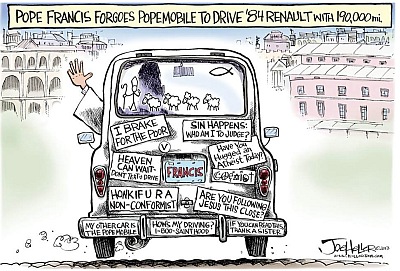
See enlarged picture below Sometimes humor is the only remedy to keep the deep sadness I feel from turning into despair. Pope Francis has become a sign of hope and joy but I still see around me persons talking the talk of our Christian faith but not walking the walk. Marquette still teaches killing and the Catholic Archdiocese is still taking the 1.1 million it received from closing down Churches in the poorest and most segregated part of the city and putting it into an endowment fund rather than a Sustainable Fund for Works of Mercy. Speaking “truth to power” can have its low points when you do not think the ‘powers to be’ are listening. A bit of humor, like this cartoon on the side and enlarged below, can save the day.
Garden work can do the same. With the help of my veteran friend Dan we got some work in the fall garden done today. Dan is become very good at making worm enriched compost into worm castings.
Faith Sharing, be it with our Tuesday morning group or our Faith In Recovery group, can also, like humor and gardening stay off despair. There are other ways to do this, children in our lives, prayer and silence but the important thing is that we use what we got to keep Hope alive.
Tomorrow I am going to a conference at Marquette where leaders of eight different religious will talk about nonviolence in their faith tradition. I am taking some leaflets along to pass out about Marquette and ROTC are Incompatible just for some release from all this good talk.
Opportunities to keep home alive are everywhere on every day, if we can just see, hear, touch them.

St. Therese of the Child Jesus A young girl born in France in 1873 entered the Carmelite convent when she was only 15; she died from tuberculosis at the age of 24. She did nothing extraordinary in her seven years in the convent but now is known as St. Therese of the Child Jesus, the Little Flower and Doctor of the Church. Today is her feast day in the Church.
She died in obscurity but when her memoirs she had written on orders of obedience to her superior became known the world discovered she did ordinary things, like washing the dishes or preparing the altar for Mass with extraordinary love. Her way of finding God in the ordinary things in life became known as the “little way” and many persons, including Dorothy Day co-founder of the Catholic Worker found great inspiration in her life.
Living fully in the moment and finding God in the depth of the ‘now’ is something I have thought and talked about. However, like Dorothy Day and Mahatma Gandhi taught us it takes extraordinary discipline and courage to find holiness in the ordinary things of life. “She believed that just as a child becomes enamored with what is before her, we should also have a childlike focus and totally attentive love. Therese’s spirituality is of doing the ordinary, with extraordinary love.” (Society of the Little Flower.)
To be more like St. Therese I realized that I must slow down. “What matters in life,” she wrote, “is not great deeds, but great love.” This great love and living fully in the present happens when we become like little children in our lives. Jesus tells us we must be like a child to enter the Kingdom of God and Therese shows us what that means.